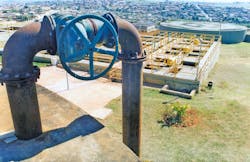Graton, Calif., Selects Chemical-Free Wastewater Disinfection System
The Northern California town of Graton has signed a contract with Pasteurization Technology Group (PTG) for the purchase and installation of PTG’s chemical-free wastewater disinfection system to handle all the city’s sewage treatment needs. By switching from a chlorine-based wastewater disinfection system to PTG’s safe, sustainable wastewater disinfection technology, Graton will realize significant operational savings and meet or exceed state water quality standards.
The innovative disinfection and cogeneration system is the linchpin of an $8.5 million project to update and upgrade the 36-year-old wastewater treatment plant, which serves the 1,700 residents of Graton. The new PTG X-500 wastewater disinfection system, which represents less than one tenth of the total project cost, can process up to 576,000 gpd—easily sufficient for Graton’s 1,700 residents. The system is planned for delivery in the spring of 2013, with project completion expected by January 2014.
Like many wastewater treatment facilities around the country, the Graton Community Sewer District is facing increasing wastewater treatment and energy costs. District management and Graton residents are also concerned about the potential harmful environmental impact of using chlorine to disinfect the town’s wastewater. The PTG system eliminates the need for toxic chemicals or costly UV lamps in the final stage of wastewater treatment. Instead, it uses pasteurization (the same process used to sanitize milk), raising the temperature of the wastewater to 180° and disinfecting it. The result is a clear, clean, pathogen-free effluent that is pure enough for irrigation of food crops.
Robert Rawson, general manager of Graton’s wastewater treatment plant, says the PTG system is a good fit for a community that has long stressed the importance of putting the environment first. “The PTG system makes sense for Graton, the environment, and our ratepayers since it uses a natural and sustainable method to disinfect our wastewater, and delivers immediate payback. Power rates are projected to increase about 7% every year for the foreseeable future, while natural gas costs are projected to stabilize or decrease,” Rawson said.
The system uses inexpensive natural gas to generate electricity, which will be used in the plant, plant offices and associated buildings. The PTG system is expected to significantly reduce the district’s costs by generating electricity at half the cost of grid power. The district will also eliminate the costs associated with purchasing and storing chlorine (a toxic and hazardous greenhouse gas).
The technology has the blessing of both federal and state regulators. It was officially included in the U.S. Environmental Protection Agency’s (EPA’s) 2012 guidelines for water reuse. In its report, the EPA noted that PTG’s technology is a proven process for effective wastewater disinfection that has undergone rigorous testing, and that offers significant cost savings over other approaches by reducing energy consumption and eliminating the use of chemicals. It is also one of the few technologies to be certified by the state of California under its stringent Title 22 standards that regulate the disinfection of water for reuse.
Source: Pasteurization Technology Group


